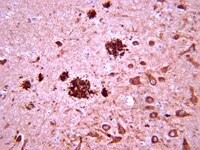EphA4 activation of c-Abl mediates synaptic loss and LTP blockade caused by amyloid-β oligomers.
Vargas, LM; Leal, N; Estrada, LD; González, A; Serrano, F; Araya, K; Gysling, K; Inestrosa, NC; Pasquale, EB; Alvarez, AR
PloS one
9
e92309
2014
Show Abstract
The early stages of Alzheimer's disease are characterised by impaired synaptic plasticity and synapse loss. Here, we show that amyloid-β oligomers (AβOs) activate the c-Abl kinase in dendritic spines of cultured hippocampal neurons and that c-Abl kinase activity is required for AβOs-induced synaptic loss. We also show that the EphA4 receptor tyrosine kinase is upstream of c-Abl activation by AβOs. EphA4 tyrosine phosphorylation (activation) is increased in cultured neurons and synaptoneurosomes exposed to AβOs, and in Alzheimer-transgenic mice brain. We do not detect c-Abl activation in EphA4-knockout neurons exposed to AβOs. More interestingly, we demonstrate EphA4/c-Abl activation is a key-signalling event that mediates the synaptic damage induced by AβOs. According to this results, the EphA4 antagonistic peptide KYL and c-Abl inhibitor STI prevented i) dendritic spine reduction, ii) the blocking of LTP induction and iii) neuronal apoptosis caused by AβOs. Moreover, EphA4-/- neurons or sh-EphA4-transfected neurons showed reduced synaptotoxicity by AβOs. Our results are consistent with EphA4 being a novel receptor that mediates synaptic damage induced by AβOs. EphA4/c-Abl signalling could be a relevant pathway involved in the early cognitive decline observed in Alzheimer's disease patients. | 24658113
 |















